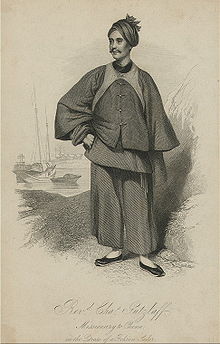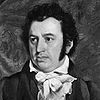- Karl Gützlaff
-
Karl Gützlaff 
Born 8 July 1803
Pyritz, Pomerania, PrussiaDied 9 August 1851 (aged 48)
British Hong KongResting place Hong Kong Cemetery Occupation Missionary, translator Title Reverend Religion Protestant Karl Friedrich August Gützlaff (8 July 1803 – 9 August 1851), anglicised as Charles Gutzlaff, was a German missionary to the Far East, notable as one of the first Protestant missionaries in Bangkok, Thailand and for his books about China. He was one of the first Protestant missionaries in China to dress like a Chinese. He gave himself a Chinese name, 郭士立 (pinyin: Guō Shìlì), but later on 郭實腊 (Simplified Chinese: 郭实腊, pinyin: Guō Shílà) became his official Chinese name. Gutzlaff Street in Hong Kong was named after him.
Contents
Life
Born at Pyritz (present-day Pyrzyce), Pomerania, he was apprenticed to a saddler in Stettin, but was able to secure admission to Pädagogium in Halle, and associated himself with the Janike Institute in Berlin.
The Netherlands Missionary Society sent him to Java in 1826, where he learned Chinese. Gutzlaff left the society in 1828, and went first to Singapore, then to Bangkok with Jacob Tomlin of the London Missionary Society, where he worked on a translation of the Bible into Thai. He made a brief trip to Singapore in December 1829, where he married a single English missionary Maria Newell. The two returned to Bangkok in February 1830 where they worked on a dictionary of Cambodian and Lao. Before the work was completed, however, Mary died in childbirth, leaving a considerable inheritance. Gutzlaff married again, this time to Mary Wanstall, in 1834. The second Mrs. Gutzlaff ran a school and a home for the blind in Macau. She died in 1849 in Singapore, and was buried there. Gutzlaff's third marriage was to Dorothy Gabriel in England in 1850.
 Gützlaff in Fujian costume
Gützlaff in Fujian costume
In Macau, and later in Hong Kong, Gutzlaff worked on a Chinese translation of the Bible, published a Chinese-language magazine, Eastern Western Monthly Magazine, and wrote Chinese-language books on practical subjects. In 1834 he published Journal of Three Voyages along the Coast of China in 1831, 1832 and 1833. Along the way he handed out tracts which had been prepared by another pioneer missionary to China, Robert Morrison.
In 1840, a group of four people (Walter Henry Medhurst, Charles Gutzlaff, Elijah Coleman Bridgman, and John Robert Morrison) cooperated to translate the Bible into Chinese. The translation of the Hebrew part was done mostly by Gutzlaff , with the exception that the Pentateuch and the book of Joshua were done by the group collectively. This translation, completed in 1847, is well-known due to its adoption by the revolutionary peasant leader Hong Xiuquan of the Taipingtianguo movement (Taiping Rebellion) as some of the reputed early doctrines of the organization. This Bible translation was a version (in High Wen-li, Traditional Chinese: 深文理) correct and faithful to the original.
In the 1830s Gutzlaff was persuaded by William Jardine of Jardine, Matheson & Co. to interpret for their ship captains during coastal smuggling of opium, with the assurance that this would allow him to gather more converts. Gutzlaff later assisted in negotiations during the Opium War of 1840–42. In response to the Chinese government's unwillingness to allow foreigners into the interior, he founded a school for "native missionaries" in 1844 and trained nearly fifty Chinese during its first four years. Unfortunately, Gutzlaff's ideas outran his administrative ability. He wound up being victimized by his own native missionaries. They reported back to him glowing accounts of conversions and New Testaments sold. While some of Gutzlaff's native missionaries were genuine converts, others were opium addicts who never traveled to the places they claimed. Eager for easy money, they simply made up conversion reports and took the New Testaments which Gutzlaff provided and sold them back to the printer who resold them to Gutzlaff.
Shattered by the exposure of this fraud, Gutzlaff died in Hong Kong in 1851. However, the Chinese Evangelization Society which he formed lived on to send out Hudson Taylor who founded the successful China Inland Mission. Taylor called Gutzlaff the grandfather of the China Inland Mission.
Works
Gützlaff's grave at Hong Kong Cemetery
- Journal of Three Voyages along the Coast of China in 1831, 1832 and 1833, with notices of Siam, Corea, and the Loo-Choo Islands (Desert Island Books, Westcliff-on-Sea, 2002)
- A Sketch of Chinese History, Ancient and Modern (London, 1834, German version in 1847)
- China Opened (1838)
- Life of Tao Kwang (1851)
Bibliography
- Herman Schlyter, Der China-Missionar Karl Gützlaff und seine Heimatbasis: Studien über das Interesse des Abendlandes an der Mission des China-Pioniers Karl Gützlaff und über seinen Einsatz als Missionserwecker (Lund: LiberLäromedel/Gleerup, 1976) ISBN 9140043738
- Winfried Scharlau (ed.), "Gützlaffs Bericht über drei Reisen in den Seeprovinzen Chinas 1831-1833" (Hamburg: Abera Verlag, 1997) ISBN 3934376134
- Thoralf Klein/Reinhard Zöllner (eds.), "Karl Gützlaff (1803-1851) und das Christentum in Ostasien: Ein Missionar zwischen den Kulturen" (Nettetal: Institut Monumenta Serica, Sankt Augustin/Steyler Verlag, 2005) ISBN 3805005202
- Waley, Arthur, The Opium War Through Chinese Eyes (1958)
External links
- Article about Gutzlaff being duped by Chinese converts
- Scanned version of the <Journal of Three Voyages> at Singapore
- University of Hong Kong library page about book and Gutzlaff
- In-print edition of Journal of Three Voyages...
- "Gutzlaff, Karl Friedrich August," Biographical Dictionary of Chinese Christianity
Protestant Group Anglican Church in Thailand · Baptist Church in Thailand · Church of Christ in Thailand · Methodist Church in Thailand · Lutheran Church in Thailand · Thailand Lahu Baptist Convention · Presbyterian Church of Thailand · Seventh-day Adventist Church in Thailand · Assemblies of God in Thailand · United Pentecostal Church of Thailand · True Jesus Church in Thailand · Thailand Covenant Church
Roman Catholic Eastern Orthodox Missionaries Louis Laneau · François Langlade · Karl Gützlaff · Eliza Grew Jones · John Taylor Jones · Maria Newell · Daniel McGilvary · Dan Beach Bradley ·
Margaret Landon ·Other pages of interest Categories:- 1803 births
- 1851 deaths
- People from Pyrzyce
- Christian missionaries in China
- Christian missionaries in Thailand
- German Christian missionaries
- German Protestants
- German Christian religious leaders
- German evangelicals
- German lexicographers
- German writers
- People from the Province of Pomerania
- Translators of the Bible into Chinese
- Translators of the Bible into Thai
Wikimedia Foundation. 2010.


